GOD’S PLAN AND PROVISIONS FOR THE PRIESTS
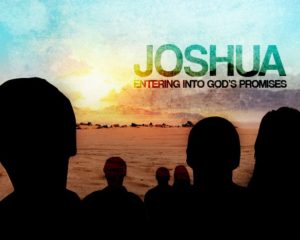 First, a little review: God’s original plan was that all of His redeemed people would become priests who would minister before Him and to each other as His representatives.
First, a little review: God’s original plan was that all of His redeemed people would become priests who would minister before Him and to each other as His representatives.
Exodus 19:5-7 ‘Now then, if you will indeed obey My voice and keep My covenant, then you shall be My own possession among all the peoples, for all the earth is Mine; [6] and you shall be to Me a kingdom of priests and a holy nation.’ These are the words that you shall speak to the sons of Israel.”
When obedience to His covenant was compromised, the privilege of the priesthood was restricted to the tribe of Levi with further privileges of service in the Tabernacle restricted to Aaron, the High Priest, and his sons.
The perfect priestly work of Jesus Christ restores all believers to the original privileges of Divine Priesthood.
1 Peter 2:9 But you are a chosen race, a royal priesthood, a HOLY NATION, a people for God’s own possession, that you may proclaim the excellencies of Him who has called you out of darkness into His marvelous light;
We find this wonderful dedication in the Apostle John’s Revelation:
To Him who loves us, and released us from our sins by His blood, [6] and He has made us to be a kingdom, priests to His God and Father; to Him be the glory and the dominion forever and ever. Amen. (Revelation 1:6)
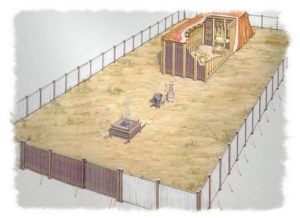 The priests of the Old Testament, the tribe of Levi, would be responsible for the nation’s worship life and their education in the Word of the Lord. The priests attended to the maintenance of the Tabernacle, its sacrificial system, and the application of the Law. They also provided music, sounded the trumpets, and called people to purposeful assembly when necessary. They had priestly privileges from which kings were excluded. (Numbers 8:5-26)
The priests of the Old Testament, the tribe of Levi, would be responsible for the nation’s worship life and their education in the Word of the Lord. The priests attended to the maintenance of the Tabernacle, its sacrificial system, and the application of the Law. They also provided music, sounded the trumpets, and called people to purposeful assembly when necessary. They had priestly privileges from which kings were excluded. (Numbers 8:5-26)
In Joshua 18, the Tabernacle, which had been carried from place to place in the 38 years of wandering in the wilderness, is set up at Shiloh (Joshua 18:1).
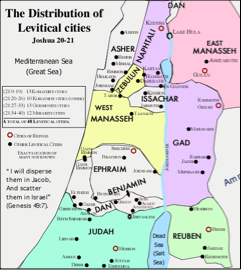 Once the land had been claimed, every tribe was allotted their portion of property upon which to settle. According to the Law of God given to Moses, the Lord Himself would be the inheritance of the Levite, and the priests would be assigned a place to live among the 12 tribes, being given possession of 48 cities spread throughout the land (Numbers 35; Joshua 21).
Once the land had been claimed, every tribe was allotted their portion of property upon which to settle. According to the Law of God given to Moses, the Lord Himself would be the inheritance of the Levite, and the priests would be assigned a place to live among the 12 tribes, being given possession of 48 cities spread throughout the land (Numbers 35; Joshua 21).
The provision of the priesthood in accessible cities is a great reminder of the value of the local church as an accessible ministry center for corporate worship and service. We are all priests before the Lord and have the privilege of gathering together with those believers in our region to minister to the Lord and each other.
Are you laying hold of your privilege to regularly gather together to minister to the Lord and your brothers and sisters?
Hebrews 10:24-25 and let us consider how to stimulate one another to love and good deeds, [25] not forsaking our own assembling together, as is the habit of some, but encouraging one another; and all the more, as you see the day drawing near.
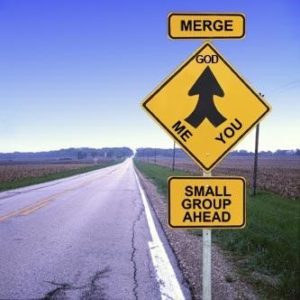 As a royal priesthood, we are spread throughout the land. Our homes become places of both Godward and outward ministry to our neighborhoods.
As a royal priesthood, we are spread throughout the land. Our homes become places of both Godward and outward ministry to our neighborhoods.
CITIES OF REFUGE (Joshua 20)
We have encountered God’s provision of “Cities of Refuge” four times previously as we have been reading through the Bible (Exodus 21:13-14; Numbers 35:11-32; Deut 4:41-43; Deuteronomy 19:2-13). These proposed cities now become a reality in Joshua 20:1-9.
These cities provided a safe place for those being pursued by blood-avengers, those seeking revenge for the death of a loved one who was accidentally killed (involuntary manslaughter). The city of refuge was designated as a visible and accessible place for the accused to flee to. They would be safely housed and given a trial by the community. If they were found to be innocent, they could dwell there in safety and would remain there as long as the High Priest lived. Then, when the High Priest died, they would be free to go back to their homestead.
The names of the Cities are given in Joshua 20:7-9. They speak of what it means to be hid with Christ in God, our refuge.
On the West side of the Jordan:
Kadesh- meaning ‘sanctuary’. We are hidden in His righteousness.
Shechem-meaning’ shoulder’- the place of burden. The High Priest carried the names of the six tribes on his shoulders when entering the Holiest of all. The Good Shepherd rescues the lost sheep and carries him home on His shoulders.
Hebron– meaning ‘fellowship’ – a joint participation in the life and activity of the Godhead.
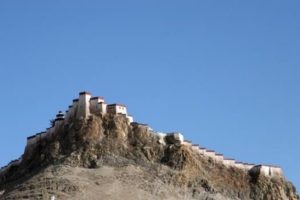 On the East side of the Jordan:
On the East side of the Jordan:
Bezer– “fortress” –a place well defended against the enemy. And in Christ, we discover what a mighty fortress is our God. And we are equipped to stand in His victory, clothed in His armor!
Ramoth– ‘exaltation’ – Yeshua, our salvation, was made a little lower than the angels, for the suffering of death, and has been exalted to the right hand of the Father and positions there with Himself, those who flee to Him by faith.
Golan– the origin of the word is more uncertain but is thought by some to mean ‘joy’ or ‘captive’. We recognize that to be captivated by His presence is to experience the fullness of joy.
GOD’S FAITHFULNESS
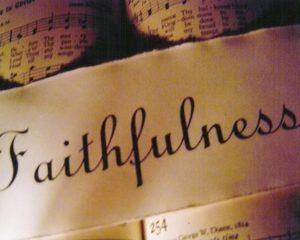 The believer’s victory and security through being identified with Christ is highlighted in Joshua 21. We can rest in the sufficiency of being found in Him.
The believer’s victory and security through being identified with Christ is highlighted in Joshua 21. We can rest in the sufficiency of being found in Him.
Joshua 21:44-45 [44] And the Lord gave them rest on every side, according to all that He had sworn to their fathers, and no one of all their enemies stood before them; the Lord gave all their enemies into their hand. [45] Not one of the good promises which the Lord had made to the house of Israel failed; all came to pass.
THE MISUNDERSTANDING AT GILEAD
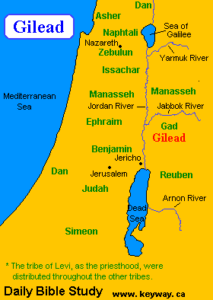 Once the tribes of Reuben, Gad, and half the tribe of Manasseh fulfilled their promise of joining with their brothers in possessing the land on the west side of the Jordan, they settled in the land they thought more suitable to their needs on the east side of the Jordan.
Once the tribes of Reuben, Gad, and half the tribe of Manasseh fulfilled their promise of joining with their brothers in possessing the land on the west side of the Jordan, they settled in the land they thought more suitable to their needs on the east side of the Jordan.
When they got there, they started to build an altar on the east side of Jordan at Gilead. On the west side, those who lived in Canaan thought they were setting up an alternative center and form of worship, perhaps even starting a new religion. It appeared that they were breaking their covenant with Yahweh and, in doing so, would be bringing down judgment upon the entire nation. (Josh 22:11)
Phinehas, who was a proven defender of fidelity in worship when Israel turned to Baal worship at Peor (Numbers 25:3), goes with ten representatives from the East Side tribes to visit the two and a half Transjordanic tribes to make a full inquiry prescribed by the law found in Deuteronomy 13:12-18.
The charge based upon their suspicion was serious:
Joshua 22:16 “Thus says the whole congregation of the Lord, ‘What is this unfaithful act which you have committed against the God of Israel, turning away from following the Lord this day, by building yourselves an altar, to rebel against the Lord this day?
It was so serious that the sons of Israel gathered at Shiloh to prepare for a war against the two and a half tribes! (Joshua 22:12)
The civil war was averted because of the faithful investigation of the facts.
 What an important lesson this is! We should be very careful not to rush to judgment without having the facts. This is prejudice- pre-judging. The careful examination discerned the motives of the two and a half tribes in building the altar. They were not rebelling against the God of Israel or His expressed will of having one center of worship, “the place of His own choosing.” Still, they wanted future generations to remember that although they had settled on the east of the Jordan, they were one with their brothers on the West side.
What an important lesson this is! We should be very careful not to rush to judgment without having the facts. This is prejudice- pre-judging. The careful examination discerned the motives of the two and a half tribes in building the altar. They were not rebelling against the God of Israel or His expressed will of having one center of worship, “the place of His own choosing.” Still, they wanted future generations to remember that although they had settled on the east of the Jordan, they were one with their brothers on the West side.
Joshua 22:21
Then the sons of Reuben and the sons of Gad and the half-tribe of Manasseh answered and spoke to the heads of the families of Israel.
Joshua 22:26-28
“Therefore we said, ‘Let us build an altar, not for burnt offering or for sacrifice; [27] rather it shall be a witness between us and you and between our generations after us, that we are to perform the service of the Lord before Him with our burnt offerings, and with our sacrifices and with our peace offerings, that your sons may not say to our sons in time to come, “You have no portion in the Lord.” ‘ [28] “Therefore we said, ‘It shall also come about if they say this to us or to our generations in time to come, then we shall say, “See the copy of the altar of the Lord which our fathers made, not for burnt offering or for sacrifice; rather it is a witness between us and you.” ‘
Joshua 22:31[31] And Phinehas the son of Eleazar the priest said to the sons of Reuben and to the sons of Gad and to the sons of Manasseh, “Today we know that the Lord is in our midst, because you have not committed this unfaithful act against the Lord; now you have delivered the sons of Israel from the hand of the Lord.”
The children of Israel were rightfully concerned for their brothers, who appeared to be in the sin of rebellion. They knew that the disobedience of one could bring great consequences upon the many. They recalled the sin of Achan, who deliberately violated the command of God, stealing and hiding the garments and silver and gold he coveted in Jericho. That secret sin caused judgment to fall upon the rest of the camp (Joshua 7).
Galatians 6:1 Brethren, even if a man is caught in any trespass, you who are spiritual, restore such a one in a spirit of gentleness; each one looking to yourself, lest you too be tempted.
Let us seek to promote restoration in a godly manner when we perceive our brothers as having fallen into sin.
NEW TESTAMENT READING: Luke 20:1-26
As we have observed in the gospels of Matthew and Mark, Jesus is examined by the elders and chief priests at the temple, just as the Passover Lambs are being examined to see if they can find any defect.
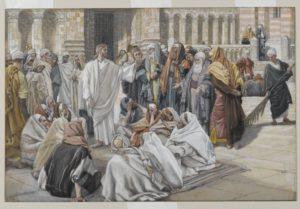 The chief priests and the scribes confront Jesus seeking to determine who authorized His ministry. Jesus answers their question with a question to reveal the question behind their question.
The chief priests and the scribes confront Jesus seeking to determine who authorized His ministry. Jesus answers their question with a question to reveal the question behind their question.
Luke 20:3-4 And He answered and said to them, “I shall also ask you a question, and you tell Me: [4] “Was the baptism of John from heaven or from men?”
Jesus was making it clear that their concern was not whether God authorized his ministry but that it was not authorized by them. They had already demonstrated that they were not aligned with the ministry of John the Baptist. Yet, the people recognized John as being a genuine prophet, authorized by God.
Luke 20:5-7 And they reasoned among themselves, saying, “If we say, ‘From heaven,’ He will say, ‘Why did you not believe him?’ [6] “But if we say, ‘From men,’ all the people will stone us to death, for they are convinced that John was a prophet.” [7] And they answered that they did not know where it came from.
Rather than falling into their trap, Jesus exposes their hypocrisy:
Luke 20:8 And Jesus said to them, “Neither will I tell you by what authority I do these things.”
 Jesus illustrates the nature of the apostate leaders of Israel with the parable of the evil vineyard workers (religious leaders) who slay all the messengers (prophets) sent by the Owner of the Vineyard (Yahweh). They reject these servants of the Owner and wound them. Then the Owner sends His beloved Son (Jesus) on a mission to bring back fruit to the Owner. Instead, the vineyard workers kill Him. The consequences of their rejection of the Son will be a heavy judgment.
Jesus illustrates the nature of the apostate leaders of Israel with the parable of the evil vineyard workers (religious leaders) who slay all the messengers (prophets) sent by the Owner of the Vineyard (Yahweh). They reject these servants of the Owner and wound them. Then the Owner sends His beloved Son (Jesus) on a mission to bring back fruit to the Owner. Instead, the vineyard workers kill Him. The consequences of their rejection of the Son will be a heavy judgment.
Luke 20:18 “Everyone who falls on that stone will be broken to pieces; but on whomever it falls, it will scatter him like dust.”
Apparently, the chief priests and scribes understood that this parable was about them. Rather than repent, their hearts were hardened, and they continued to plot how they might catch Jesus and deliver Him to the Roman authorities for execution.
In order to do this, they needed to bring evidence that He was guilty of insurrection against Roman authority and was instructing people not to pay their taxes (Luke 23:2).
Luke 20:22 “Is it lawful for us to pay taxes to Caesar, or not?”
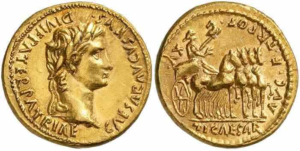 Jesus’ answer is profound. He gives us a strategy for how we live in this world while still showing proper respect for delegated authority.
Jesus’ answer is profound. He gives us a strategy for how we live in this world while still showing proper respect for delegated authority.
He calls for a denarius. Notice it is not Jesus who produces it, but His accusers. He asks the question, “Whose portrait and inscription is on it?”
The denarii had the portrait and inscription of Caesar, “son of the divine Augustus” and “Greatest Priest” and “Son of God” on the back of it.
“Caesar’s” they replied.
Jesus then said to them. “Then give to Caesar what is Caesar’s and to God what is God’s”
God’s stamp is on everything He has made. God’s image is perfectly reflected in Christ. We were made in the image of God and although His likeness has been effaced and distorted through sin, we belong to Him.
Jesus again responds to the priests’ question by giving an answer that proves their guilt in failing to recognize the image of God (Jesus as the Messiah, the true Son of God) and pay Him tribute.
READING FROM THE PSALMS- Psalm 89:1-13
Psalm 89 is an important Psalm in relation to the covenant that God made with King David. God made a promise to establish the throne of David, as a kingdom that would be without end. It becomes increasingly clear as we read through the Bible that this would be through the work of the Promised Messiah, the Son of David. David’s descendant Jesus of Nazareth is in view. Yet with respect to David himself, and his descendants, we see it is a covenant of mercy. You have heard it said that grace is getting what we don’t deserve; mercy is not getting what we do deserve.
When the house of David divided and the united kingdom was torn into two, the Psalmist sings of the ongoing manifestations of God’s superlative lovingkindness.
The Hebrew word for ‘mercy’ is ‘hesed’ and it is used 7 times in this Psalm. In the first four verses, the Psalmist sings of the mercy of God’s covenant commitment to the house of David.
In the second group of four verses, verses 5-8, the heavens give God praise.
In the next 5 verses, verses 9 through 13, the seas, the earth, and all it contains of wonders such as its majestic mountains (Hermon and Tabor) are a testimony to the work of His hands.
In verse 8, the Psalmist praises God for His faithfulness. This word is also found seven times in this Psalm and refers to the steadfastness of God’s character. In the midst of all our unfaithfulness, He abides faithful.
Tomorrow we will come to part two of this reading and learn more about the splendor of God’s faithfulness and mercy as revealed in the Davidic covenant, the covenant that God made with His servant, David.
So may we sing of the mercies of the Lord this day and join with the praise of the Pslamist (v. 1-4) the praise from the heavens (v 5-8) and the praise from the earth (v.9-13).
The Lord shows His mercy and faithfulness in so many ways, and here especially in His covenant promise to establish the Son of David on His throne!
READING FROM PROVERBS- Proverbs 13:15-16
Good understanding produces favor,
But the way of the treacherous is hard.
[16] Every prudent man acts with knowledge,
But a fool displays folly.
Good sense speaks of good understanding, spiritual, emotional, relational, and practical intelligence, and being able to apply it appropriately. It leads to a favorable reception, social esteem.
PRAY FOR THE NATIONS-
(p. 252-255 in the Prayer Guide “OPERATION WORLD”)
The British wrested Hong Kong from China in the infamous Opium Wars (1840-58) through the 1842 Treaty of Nanking. The PRC resumed control in 1997, but its constitutional document, the Hong Kong Basic Law, guarantees the existing legal, political, and economic structures for 50 years. While it does not possess 100% of the democratic freedoms, it remains one of the most open and free societies in Asia. China is responsible for the defense and foreign policy under the “One Country, Two Systems” policy. Democracy advocates have recently been arrested as China is taken a harder line against growing protests.
There is a continuing need for renewal and revival. Only half of Protestants regularly attend church. Many high-profile crusades have drawn much attention but little lasting fruit. The church renewal movement works towards cultivating spiritual change and social impact of churches.
Christian leadership is in short supply, with only 2/3 of congregations having a pastor. Emigration contributes substantially to this so that a much younger and less experienced generation of leaders is forced to emerge. Pray for the training of leaders.
PRAYER: Father, You are faithful in having called us into fellowship through Your Son, Jesus Christ our Lord, our Refuge, our Sanctuary, our Fortress, our Joy, and our Salvation. We take delight in the merciful inheritance we have received, secured by His obedience to the death of the cross. We sing of Your faithfulness and Your grace. We appeal to You for fresh wisdom to act according to the knowledge You give us through Your infallible Word. In Jesus’ Name. Amen.
Pastor David
So, naturally, we proclaim Christ! We warn everyone we meet, and we teach everyone we can, all that we know about him, so that, if possible, we may bring every man up to his full maturity in Christ. (Colossians 1:28, J.B. Phillips paraphrase)
New Life Community Church, Concord, MA 10742
www.newlife.org

